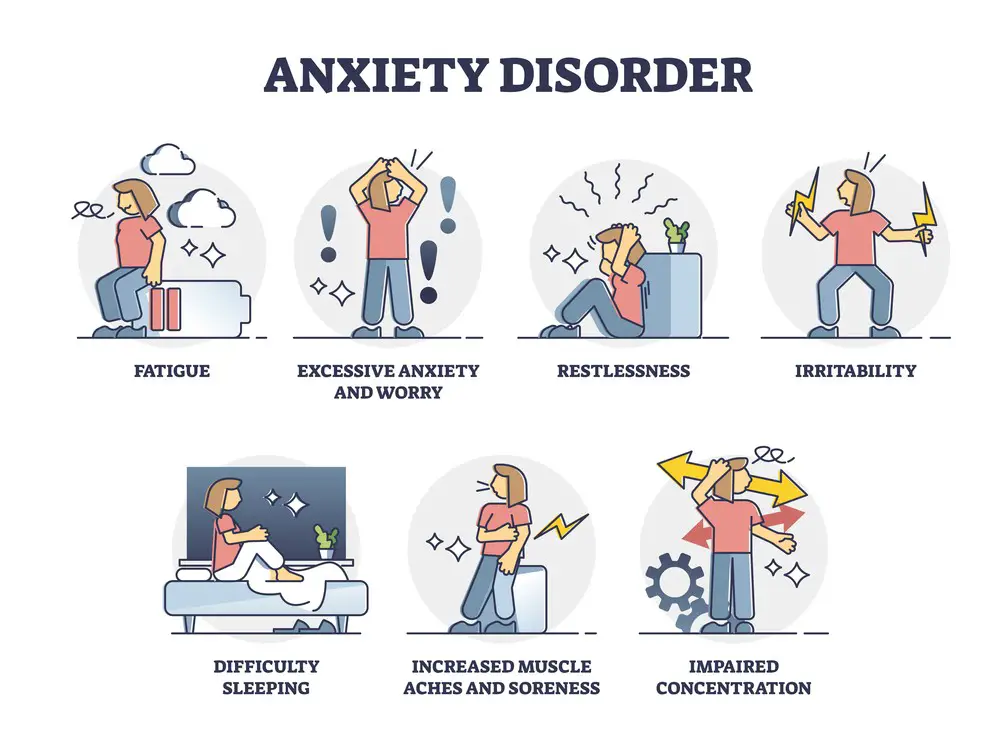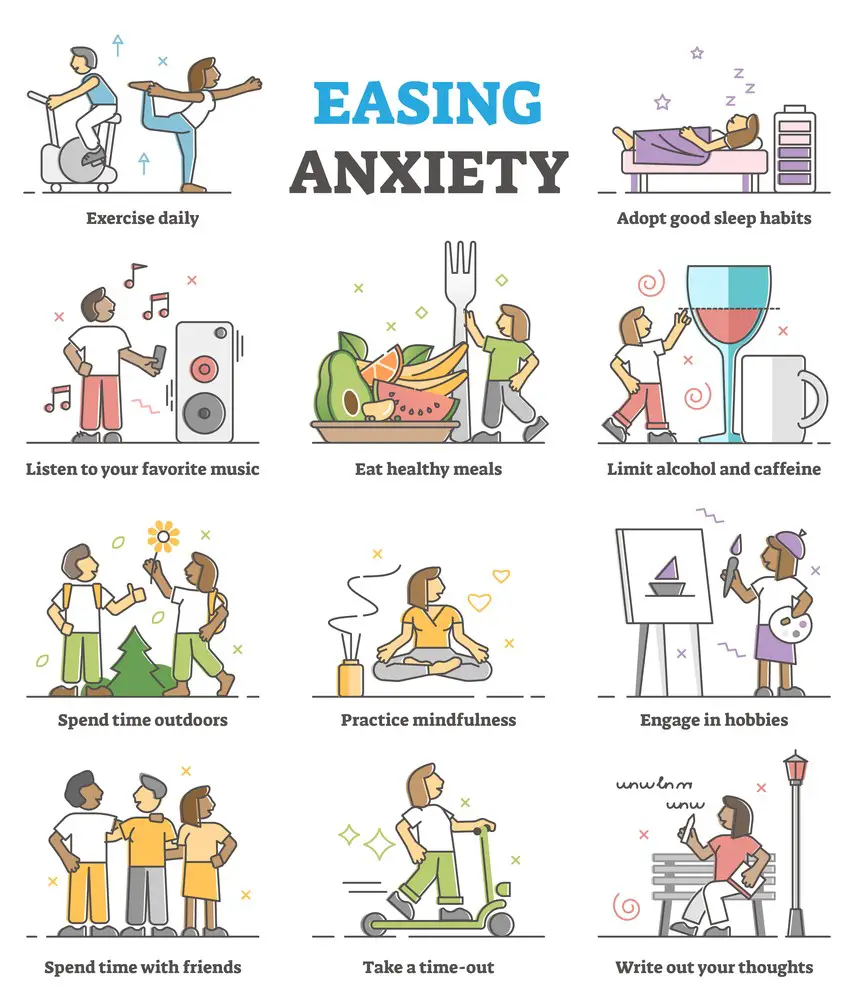As a BetterHelp affiliate, we receive compensation from BetterHelp if you purchase products or services through the links provided
You might often find yourself caught in an overwhelming cycle of stress and anxiety. But what’s the connection? Understanding the relationship between these two common conditions can unlock strategies for managing their impact on your life. Let’s delve into the complexities of anxiety and stress and how they interrelate.
Psychological Responses
 Our psychological responses play a crucial role in connecting stress and anxiety. Lots of patients who reached out to Sarah Buckle Psychotherapy & Counselling services have learned how stress, often driven by external factors, triggers a ‘fight or flight’ response in our body that helps us deal with immediate threats. This can lead to symptoms such as increased heart rate, rapid breathing, and heightened senses.
Our psychological responses play a crucial role in connecting stress and anxiety. Lots of patients who reached out to Sarah Buckle Psychotherapy & Counselling services have learned how stress, often driven by external factors, triggers a ‘fight or flight’ response in our body that helps us deal with immediate threats. This can lead to symptoms such as increased heart rate, rapid breathing, and heightened senses.
On the other hand, anxiety often arises from internal worries or fears about potential future scenarios that are uncertain or perceived as dangerous. This anticipatory anxiety can continuously stimulate our stress response, creating a cyclical pattern. Over time, enduring this cycle can result in chronic stress and heightened anxiety levels, making it difficult to differentiate between the two. Understanding this connection helps in identifying effective coping mechanisms and therapeutic interventions to break this cycle.
Cognitive Impact
The cognitive impact plays a significant role in the connection between anxiety and stress. Your thoughts and perceptions are pivotal in determining your reactions to various situations. When you are stressed, you may start to perceive even non-threatening situations as threats. This distorted perspective can trigger feelings of anxiety. Similarly, if you are anxious, you may overthink and catastrophize situations, leading to stress. This cyclical pattern can escalate, causing debilitating effects on your mental wellbeing.
However, understanding the cognitive links between stress and anxiety can empower you to implement effective strategies, such as cognitive behavioral therapy, to reframe your thoughts and break the cycle. By recognizing and challenging your cognitive distortions, you can manage your stress and anxiety more effectively, fostering a more positive and balanced emotional state.
Emotional Overload
 Lots of different things can cause people to experience emotional overload. Here are some examples:
Lots of different things can cause people to experience emotional overload. Here are some examples:
- Chronic stress
- Traumatic events
- Personal loss
- Work pressure
- Relationship struggles
- Health issues
- Financial strain
- Uncertainty and changes
- Overstimulation
- Lack of self-care
- Unmet needs
This occurs when one experiences overwhelming emotions, often due to the abovementioned factors that exceed their emotional coping capacity. As this overload continues, it can trigger increased levels of anxiety as the individual anticipates potential future stressors.
Simultaneously, the stress levels rise as the person grapples with overwhelming emotionality. This intertwining of stress and anxiety in the face of emotional overload creates a vicious cycle that can be hard to break, leading to chronic stress and heightened anxiety.
Uncertainty and Anticipation
Uncertainty and anticipation are key players in the intricate relationship between stress and anxiety. It’s about the future that can trigger anxiety as we fear potential threats or adverse outcomes. This anticipatory anxiety puts our body’s stress response into overdrive, preparing us for perceived dangers.
Conversely, living in a state of constant anticipation can keep us on edge, heightening our stress levels. This anticipatory stress can fuel our anxiety as we worry about future stressors, creating a continuous loop of anxiety and stress. Understanding this interplay can be a powerful tool in managing and alleviating anxiety and stress, allowing us to break the cycle and regain control over our emotional well-being.
Impact on Coping Mechanisms
 Under normal circumstances, coping mechanisms aid in managing stress, thus preventing the onset of anxiety. However, in the face of chronic stress and heightened anxiety, these coping mechanisms may become overwhelmed or ineffective. The inability to effectively manage stress levels can further trigger anxiety as the individual feels unequipped to handle the situation.
Under normal circumstances, coping mechanisms aid in managing stress, thus preventing the onset of anxiety. However, in the face of chronic stress and heightened anxiety, these coping mechanisms may become overwhelmed or ineffective. The inability to effectively manage stress levels can further trigger anxiety as the individual feels unequipped to handle the situation.
Concurrently, the ongoing anxiety can exacerbate stress, as the person’s constant worry and fear hinder their ability to respond adequately to stressors. This symbiotic relationship can create a vicious cycle of escalating stress and anxiety, further impairing the individual’s coping mechanisms and their ability to manage their mental well-being.
Behavioral Pattern
These patterns — avoidance behaviors, restlessness, or excessive worrying — can exacerbate both conditions. For instance, an individual might avoid certain situations or activities due to fear of triggering stress, thereby increasing their anxiety about potential adverse outcomes. Simultaneously, persistent anxiety can lead to behaviors such as obsessive checking or over-preparing in an attempt to mitigate the perceived threat.
These behaviors can heighten stress levels as they often reinforce negative thought patterns and place additional pressure on the individual. This reciprocal relationship between anxiety and stress perpetuates a vicious cycle, with each feeding the other. Recognizing and addressing these behavioral patterns is essential in breaking the cycle and managing both stress and anxiety effectively.
In your journey to understand stress and anxiety, remember that these conditions are intrinsically linked and can form a vicious cycle that’s hard to break. But by understanding how they connect, you can employ strategies like cognitive behavioral therapy or mindfulness to interrupt this cycle, effectively managing your mental well-being. You can challenge stress and anxiety, fostering a healthier emotional state.
- 7 Ideas to Help You Relax and Unwind on a Family Vacation - April 27, 2025
- How Having Cybersecurity Protection Helps You Relax - April 25, 2025
- 8 Reasons Why Spending Time Outside Calms You Down - April 25, 2025
This site contains affiliate links to products. We will receive a commission for purchases made through these links.



